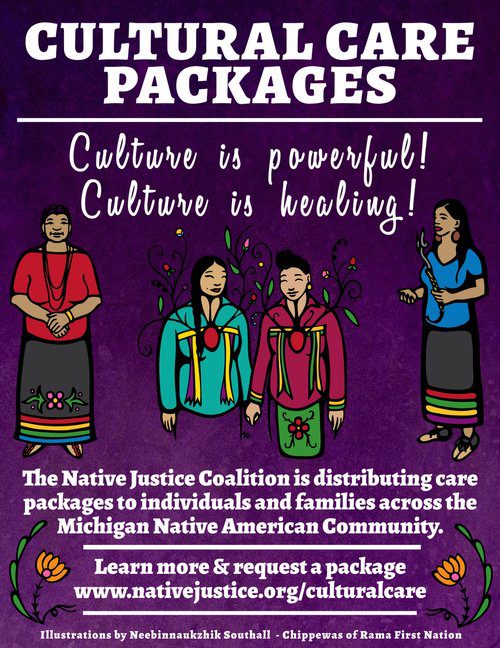The Native Justice Coalition engages in various special projects & initiatives with our community partners. Often, these are related to our main program areas such as the Healing Stories program or past programs such as the Harm Reduction Program. These also link to issues such as Native-led racial justice, treaty rights, land back, food sovereignty, and decolonization.
If you are interested in partnering or collaborating with us please contact us. Below are some of our current initiatives and past projects!
“The 54-minute film will be followed by a panel discussion with several members of the Native American community whose families have been directly impacted by forced removal of Native American children to so-called “boarding schools.”.
“Dawnland” tells the story of Indigenous child removal in the U.S. and the nation’s first-ever government-endorsed truth and reconciliation commission, which investigated the devastating impact of Maine’s child welfare practices on the Wabanaki people.”
– Film screening, panel discussion slated on Native American ‘boarding schools’
Documentaries & Films
The Native Justice Coalition has a variety of documentaries and films that we screen at our events! In the past, we have collaborated with our community partners to host virtual and in-person events. We are creative with approaches and how these films connect with our work.
For example, we can screen Sisters Rising, have a panel discussion, vigil, prayer, and fundraiser all in one. This event could be for MMIWG2S (Missing and Murdered Indigenous Women, Girls & Two-Spirits) justice combined with addressing other issues such as Native led harm reduction and healing justice.
We have the licensing rights to screen all the films listed below.
If you are interested in working with us please contact us today!
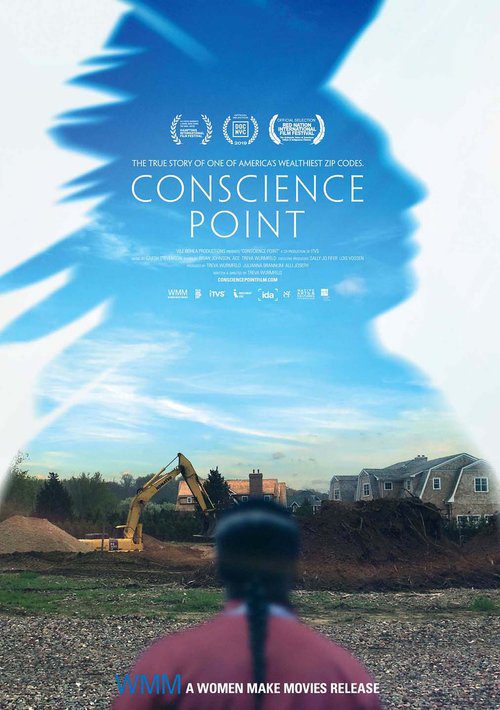
Conscience Point
Beneath the mystique of The Hamptons, among one of the wealthiest zip codes in the U.S., lies the history of the area’s original inhabitants. The Shinnecock Indian Nation were edged off their land over the course of hundreds of years, pushed onto an impoverished reservation, and condemned to watch their sacred burial grounds plowed to make way for mega-mansions and marquee attractions like the exclusive Shinnecock Hills Golf Club–five-time host of the U.S. Open.
CONSCIENCE POINT tracks this fractured history alongside the path of one woman determined to make a stand: Shinnecock activist Rebecca “Becky” Hill-Genia who, together with other tribal members and allies, has waged a relentless, years-long battle to protect the land and her tribe’s cultural heritage from the ravages of development and displacement. Now both the Shinnecock Nation and town residents face a new challenge; the onslaught of elite newcomers who threaten the very place they intend to cherish.
Dawnland
For decades, child welfare authorities have been removing Native American children from their homes to “save them from being Indian.” In Maine, the first official Truth and Reconciliation Commission in the United States begins a historic investigation. Dawnland goes behind-the-scenes as this historic body grapples with difficult truths, redefines reconciliation, and charts a new course for state and tribal relations. Dawnland aired on Independent Lens on PBS in November 2018 reaching more than 2 million viewers. The film won a national Emmy® Award for Outstanding Research in 2019 and made the American Library Association’s list of 2020 Notable Videos for Adults: “a list of 15 outstanding films released on video within the past two years.”
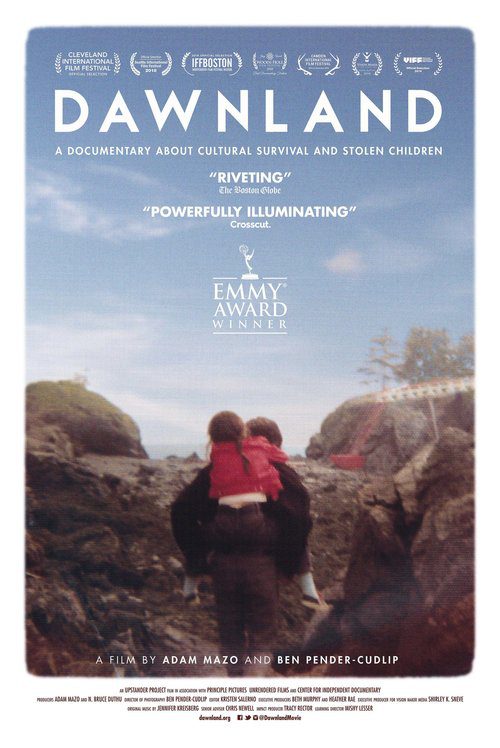
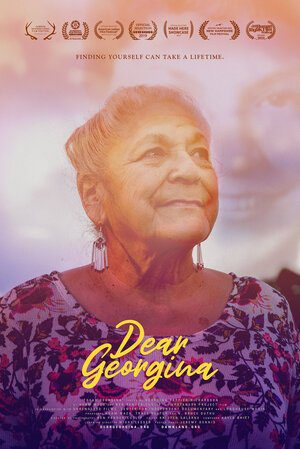
Dear Georgina
At age two Georgina Sappier-Richardson was removed from her home and Passamaquoddy community in downeast Maine by child protection services. She would never see her parents again. Terror and abuse followed over 16 years in four different foster homes.
Dear Georgina follows this Passamaquoddy elder from Motahkomikuk as she tries to fill in the blurry outlines of her identity. Now a grandmother Georgina is still attempting to re-integrate herself into the community she barely knew.
Home From School
In 2017, a delegation of Northern Arapaho tribal members traveled from Wyoming to Pennsylvania to retrieve remains of three children who died at Carlisle Indian Industrial school in the 1880s. It’s a journey into the troubled history of Indian boarding schools and a quest to heal generational wounds.
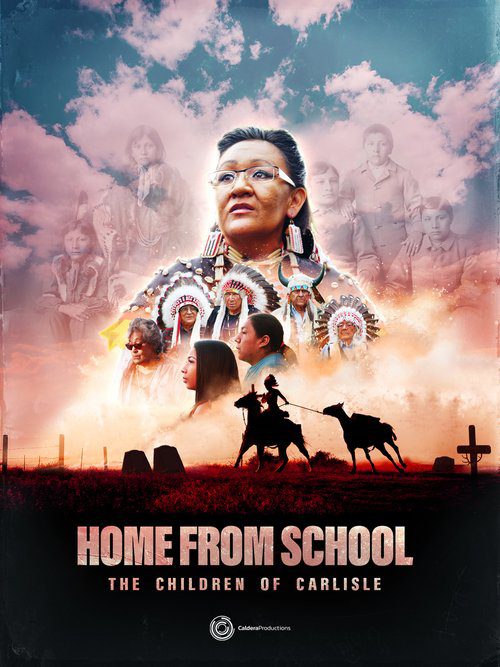
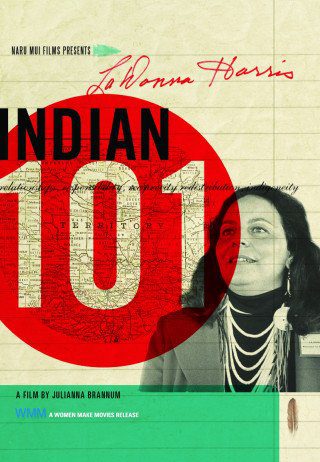
Ladonna Harris: Indian 101
LADONNA HARRIS: INDIAN 101 from Comanche filmmaker Julianna Brannum, chronicles the life of Comanche activist and national civil rights leader LaDonna Harris and the role that she has played in Native and mainstream America history since the 1960s. In this new verite style documentary, Brannum, the great niece of Harris, celebrates her life and the personal struggles that led her to become a voice for Native people and her contemporary work to strengthen and rebuild indigenous communities and train emerging Native leaders around the world.
Harris’s activism began in Oklahoma, fighting segregation and assisting grassroots Native and women’s groups. In Washington LaDonna introduced landmark programs and legislation returning territory to tribes, improving education and healthcare for Native Americans, ending job discrimination against women, and targeting other pressing issues of the time. For over three decades, “Indian 101,” her course for legislators, combatted ignorance about America’s most marginalized population. Using interviews, archival footage and photographs, this film justly celebrates one of the most important women leaders in Native American and U.S. history.
Sisters Rising
SISTERS RISING is the story of six Native American women fighting to restore personal and tribal sovereignty in the face of ongoing sexual violence against Indigenous women in the United States.
Native American women are 2.5 times more likely to experience sexual assault than all other American women. 1 in 3 Native women report having been raped during her lifetime and 86% of the offenses are committed by non-Native men. These perpetrators exploit gaps in tribal jurisdictional authority and target Native women as ‘safe victims’. The film follows six women who refuse to let this pattern of violence continue in the shadows: a tribal cop in the midst of the North Dakota oil boom, an attorney fighting to overturn restrictions on tribal sovereignty, a teacher of Indigenous women’s self-defense, grassroots advocates working to influence legislative change, and the authour of the first anti-sex trafficking code to be introduced to a reservation’s tribal court. Their stories shine an unflinching light on righting injustice on both an individual and systemic level.
SISTERS RISING is an urgent call to action, a gorgeous portrait of powerful women acting in solidarity, and a demand for tribal sovereignty and self-determination as the necessary step towards ending violence against Native women.
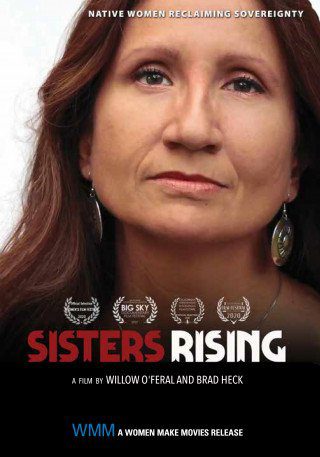
Previous Screenings
Current Projects & Initiatives
Currently, we are collaborating with the University of Wisconsin-Madison on a research project. We have begun research focused on the Great Lakes Native American, First Nations, Métis & Inuit identities. A highlight of this work is having an Indigenous-led Advisory Board to guide the project.
Cultural Care Packages
Our Cultural Care Package initiative was a special project we had engaged in during the pandemic to support the Michigan Native American community across the state. During this time we distributed roughly 500 care packages. These care packages went to communities including but not limited to the Keweenaw Bay Indian Community, Lac Vieux Desert Band of Lake Superior Chippewa, Peshawbestown, Sault Ste. Marie, Mt. Pleasant, Escanaba, Hazel Park, Manistee, Baldwin, Grand Rapids, Muskegon, Saginaw, Flint, Dorr, Shelbyville, Alanson, and Bruce Crossing.
We received a lot of positive and uplifting feedback regarding this initiative. As a result, we decided to continue this initiative in 2022 during the holiday season. In the fall, we applied for a grant through the Solidaire Network – Capacity Strengthening Fund and were awarded a grant for this work!
In December 2022, we distributed 300 cultural care packages to individuals and families across the Michigan Native American community. Now the Cultural Care Package initiative is a permanent part of our organization. It is our goal to continue to grow this initiative and make an even greater impact in subsequent years.
